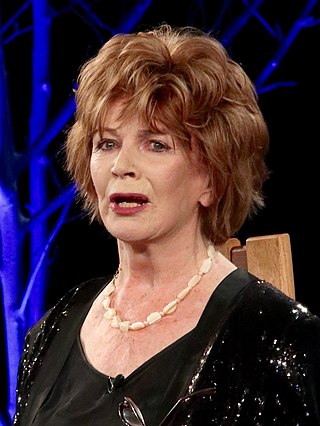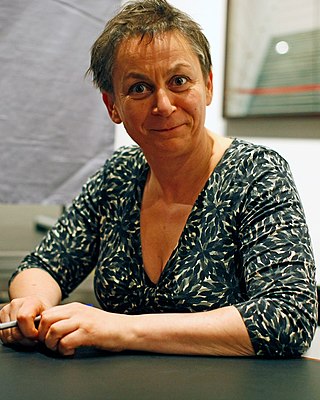Related Research Articles

The first Irish prose fiction, in the form of legendary stories, appeared in the Irish language as early as the seventh century, along with chronicles and lives of saints in Irish and Latin. Such fiction was an adaptation and elaboration of earlier oral material and was the work of a learned class who had acquired literacy with the coming of Latin Christianity. A number of these stories were still available in manuscripts of the late medieval period and even as late as the nineteenth century, though poetry was by that time the main literary vehicle of the Irish language.

Josephine Edna O'Brien is an Irish novelist, memoirist, playwright, poet and short-story writer. Elected to Aosdána by her fellow artists, she was honoured with the title Saoi in 2015 and the biennial "UK and Ireland Nobel" David Cohen Prize in 2019, whilst France made her Commandeur de l'Ordre des Arts et des Lettres in 2021.

William John Banville is an Irish novelist, short story writer, adapter of dramas and screenwriter. Though he has been described as "the heir to Proust, via Nabokov", Banville himself maintains that W. B. Yeats and Henry James are the two real influences on his work.
Sebastian Barry is an Irish novelist, playwright and poet. He was named Laureate for Irish Fiction, 2018–2021.
Thomas F. Kilroy was an Irish playwright and novelist.

Claire Keegan is an Irish writer known for her short stories, which have been published in The New Yorker, Best American Short Stories, Granta, and The Paris Review.

Anne Teresa Enright is an Irish writer. The first Laureate for Irish Fiction (2015–2018) and winner of the Man Booker Prize (2007), she has published eight novels, many short stories, and a non-fiction work called Making Babies: Stumbling into Motherhood, about the birth of her two children. Her essays on literary themes have appeared in the London Review of Books and The New York Review of Books, and she writes for the books pages of The Irish Times and The Guardian. Her fiction explores themes such as family, love, identity and motherhood.
Mary Morrissy is an Irish novelist and short story writer. She writes on art, fiction, and history. Morrissy is an elected member of Aosdána, Ireland's academy of artists and writers.
Tana French is an American-Irish writer and theatrical actress. She is a longtime resident of Dublin, Ireland. Her debut novel In the Woods (2007), a psychological mystery, won the Edgar, Anthony, Macavity, and Barry awards for best first novel. The Independent has referred to her as "the First Lady of Irish Crime".
The Kerry Group Irish Novel of the Year Award is an annual award for Irish authors of fiction, established in 1995. It was previously known as the Kerry Ingredients Book of the Year Award (1995–2000), the Kerry Ingredients Irish Fiction Award (2001–2002), and the Kerry Group Irish Fiction Award (2003-2011).
Eileen Battersby was the chief literary critic of The Irish Times. She sometimes divided opinion, having been described by John Banville as "the finest fiction critic we have", while attracting the ire of Eugene McCabe after she gave Dermot Healy an unfavourable review in 2011. Her first novel, Teethmarks on My Tongue, was published by Dalkey Archive Press in 2016.

Ancient Light is a 2012 novel by John Banville. First published on 7 July 2012, the novel concludes a trilogy concerning Alexander Cleave and his daughter, Cass. Eclipse (2000) and Shroud (2002) were Ancient Light's literary predecessors in the Banville canon.

Athena is a 1995 novel by the Irish author John Banville, the third in a series that started with The Book of Evidence and continued with Ghosts. These three form the "Frames" trilogy, linked by the theme of paintings.
Belinda McKeon is an Irish writer. She is the author of two novels, Solace, which won the 2011 Geoffrey Faber Memorial Prize, and Tender (2015).
Audrey Magee is an Irish novelist and journalist. Her debut novel, The Undertaking, was nominated for the Baileys Women's Prize for Fiction in 2014. Her novel The Colony was longlisted for the 2022 Booker Prize.
Sara Baume is an Irish novelist. She was named on Granta magazine's "Best of Young British Novelists" list 2023.

Sally Rooney is an Irish author and screenwriter. She has published three novels: Conversations with Friends (2017), Normal People (2018), and Beautiful World, Where Are You (2021). The first two were adapted into the television miniseries Normal People (2020) and Conversations with Friends (2022).
Heather Elizabeth Ingman is a British academic, noted for her work on Irish and British women's writing, the Irish short story, gender studies and modernism. Also a novelist and journalist, Ingman has worked in Ireland and the UK, especially at Trinity College Dublin, where she is an Adjunct Professor of English and Research Fellow in Gender Studies.

Normal People is a 2018 novel by the Irish author Sally Rooney. Normal People is Rooney's second novel, published after Conversations with Friends (2017). It was first published by Faber & Faber on 30 August 2018. The book became a best-seller in the US, selling almost 64,000 copies in hardcover in its first four months of release. A critically acclaimed and Emmy nominated television adaptation of the same name aired from April 2020 on BBC Three and Hulu. A number of publications ranked it one of the best books of the 2010s.
Caitríona Lally is an Irish writer. She has published two novels: Eggshells (2017) and Wunderland (2021). In 2018 she was awarded the Rooney Prize for Irish Literature.
References
- ↑ Downey, Sarah (24 November 2010). "Catching up with Claire Kilroy". writing.ie. Retrieved 13 November 2014.
- ↑ "Claire Kilroy". irelandliteratureexchange.com. 13 August 2019.
- ↑ Langan, Sheila (17 February 2011). "Young Irish Writers Part 2: Claire Kilroy". irishamerica.com. Irish America LLC.
- ↑ Spain, John (11 January 2008). "All Summer by Claire Kilroy". The Irish Independent.
- ↑ "Claire Kilroy". faber.co.uk. Retrieved 13 November 2014.
- ↑ Tenderwire . Retrieved 13 November 2014.
{{cite book}}:|website=ignored (help) - ↑ Hagestadt, Emma (4 June 2009). "All Names Have Been Changed, By Claire Kilroy". The Independent.
- ↑ Davies, Stevie (31 August 2012). "The Devil I Know by Claire Kilroy – Review". The Guardian. Guardian News and Media. Retrieved 13 November 2014.
- ↑ "Heimbold Chair". villanova.edu. Villanova University. Archived from the original on 27 November 2014. Retrieved 13 November 2014.
- ↑ Burke, Mary. "Claire Kilroy: An Overview and an Interview." LIT: Literature Interpretation Theory 28:1 (2017): 13–33. http://www.tandfonline.com/doi/full/10.1080/10436928.2017.1273731
- ↑ Merritt, Stephanie (12 June 2023). "Soldier Sailor by Claire Kilroy review – a mother's confession after the fight of her life". The Observer. ISSN 0029-7712 . Retrieved 13 June 2023.
- ↑ Ali, Monica (24 April 2024). "'Six spellbinding and thought-provoking novels': why we chose the Women's prize for fiction shortlist". The Guardian. ISSN 0261-3077 . Retrieved 24 April 2024.
